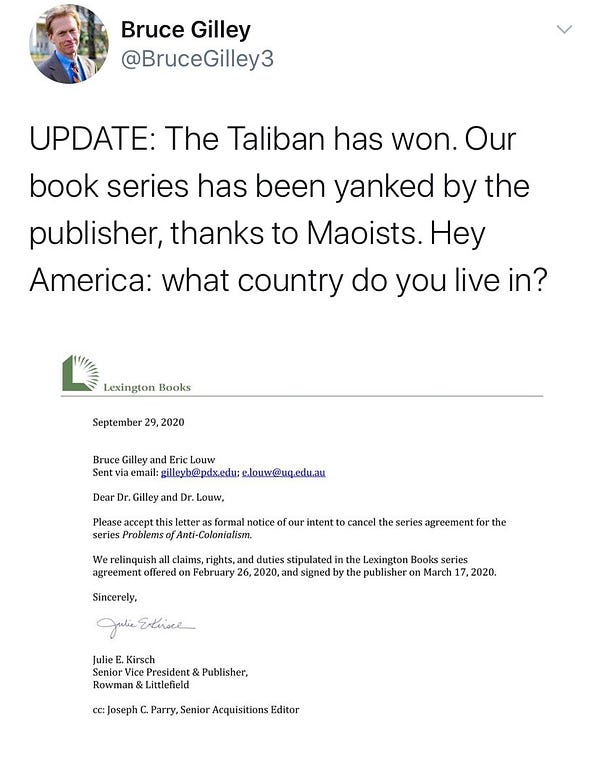Academics creating and using fake Twitter accounts is not a new thing, but it is still so satisfying when the case is cracked. This time it is pretending to be a woman of color
@piney_the (now erased, but archived here) purports to be a Woman in STEM who has all the hallmarks of the shitty right-wing takes about “snowflakes” and women are not fit for science, blah blah blah.
Turns out it is run by Craig Chapman, a theoretical chemist. He has since deleted account, but the internet is forever honey, and can be found here.
The real story here is that people who do this are academics who live for research, who can quickly suss out what is going on. And evidence has been entered into the record.


Meanwhile, Lexington books decided to publish a whole series—as in, multiple books— on The Problems of Anti-colonialism. If you cancel out the double negatives, yes, that is not only supporting colonialism but also criticizing those who oppose it.
Anti-colonialism emerged in the late 19th century as a critique of European empires and colonial administrations throughout the Third World. The attack on European imperialism grew into a post-World War II program of decolonization that transformed global politics. A narrative of celebratory decolonization spawned a broader program of change in domestic and international politics. Anti-colonial, decolonizing, and post-colonial narratives insisted on negative portrayals of Western colonialism, amnesia about non-Western colonialism, Western guilt about colonial pasts, rapturous accounts of decolonization, and Utopian claims of post-colonial futures.
Co-editor of the series is Bruce Gilley, who you may remember from his scorching hot take “The Case for Colonialism” in Third World Quarterly. (The fact that it passed a peer review is another story entirely.) Interesting development, however, is that the books series is now absent from Lexington books catalog, although the original call for manuscripts is still up.
Then, Lexington books realizes their oopsie:
Well, Bruce, the country we live in is not a place where you can make shoddy arguments with your Ph.D. I often grapple with the idea of a “diversity” of ideas in academia, and I am always here for critical arguments and opposing views. But, as the question I always ask in evaluating academia is, what is this helping? What does this new knowledge contribute? And trying one’s very hardest to convince us that colonialism is what makes us great! is something I would not be surprised to hear at a Proud Boys Rally. Not to mention that other history scholars have shown his shoddy scholarship.
Lexington Books (or some editor) thought it was okay to go ahead with this series but only canceled when there was pushback. The right thing to do was cancel but seriously get a grip. Did they think the books would sell off of hate reads? I know academic publishers are desperate for sales, but FFS.
If you are tempted to read more about the myth of colonialism, please don’t. It’s a pseudo-intellectual science that has arguments that amount to “well, some of the New World people also got sick! See? fake news!”
First, no matter who ‘discovered’ the New World, it is inevitable that a large proportion of New World inhabitants would have died within the first few decades after first contact. This is universally acknowledged by specialists in the field. The New World population was smaller and more homogenous than the Old World population. Thus, its people had less immunity to disease than the people of the Old World, where disease communities from Africa, Asia and Europe had been intermingling for millennia. Even though some European captains did try and spread smallpox around a few forts and villages from time to time, the effect of their efforts was almost negligible compared with the natural spread of disease. So the claims of genocide by disease have almost nothing to do with European actions, apart from their simply reaching the New World. And of course, Europeans of the time had no way of envisioning the continent-wide epidemic repercussions of their actions. Verdict: not guilty.
Hate watching reality shows is fun, but hate reading academic work is gut-wrenching.
What is this? A semi-regular newsletter about culture and academia and academic culture. Do you like it? Great. Please share it widely. And consider becoming a premium subscriber.




